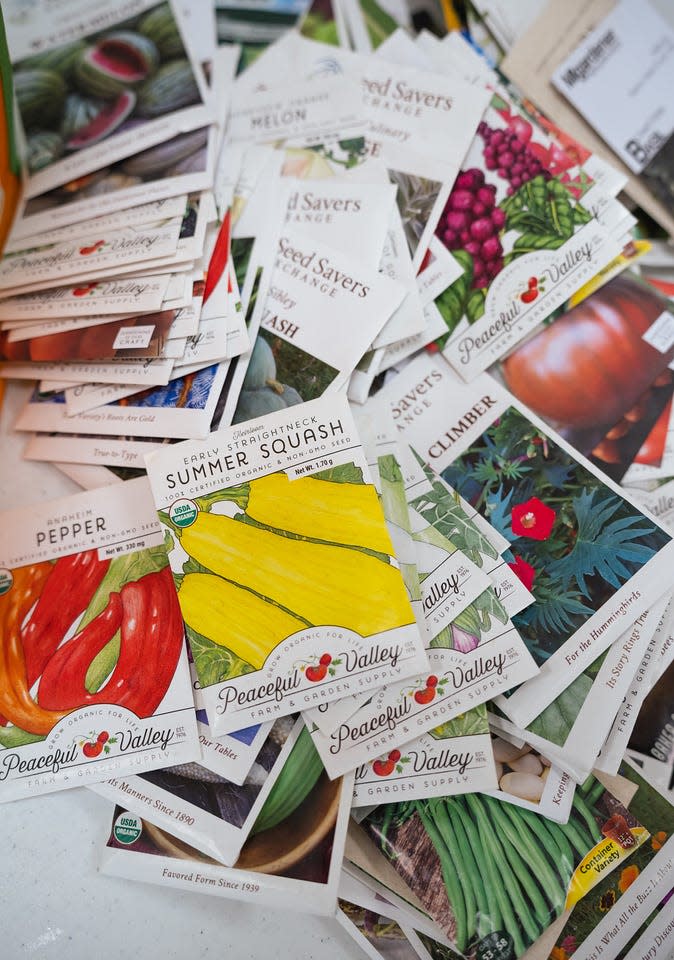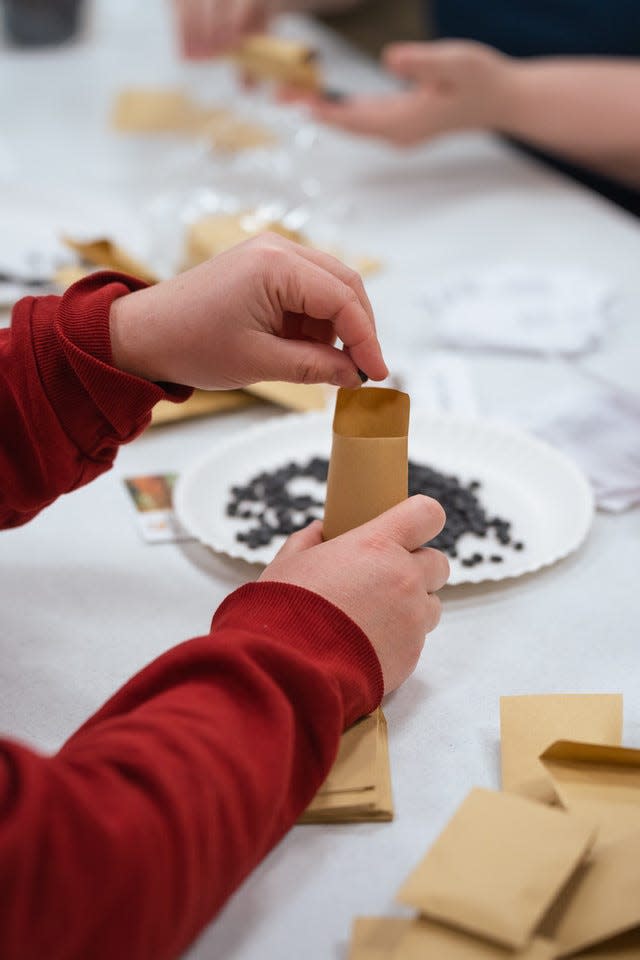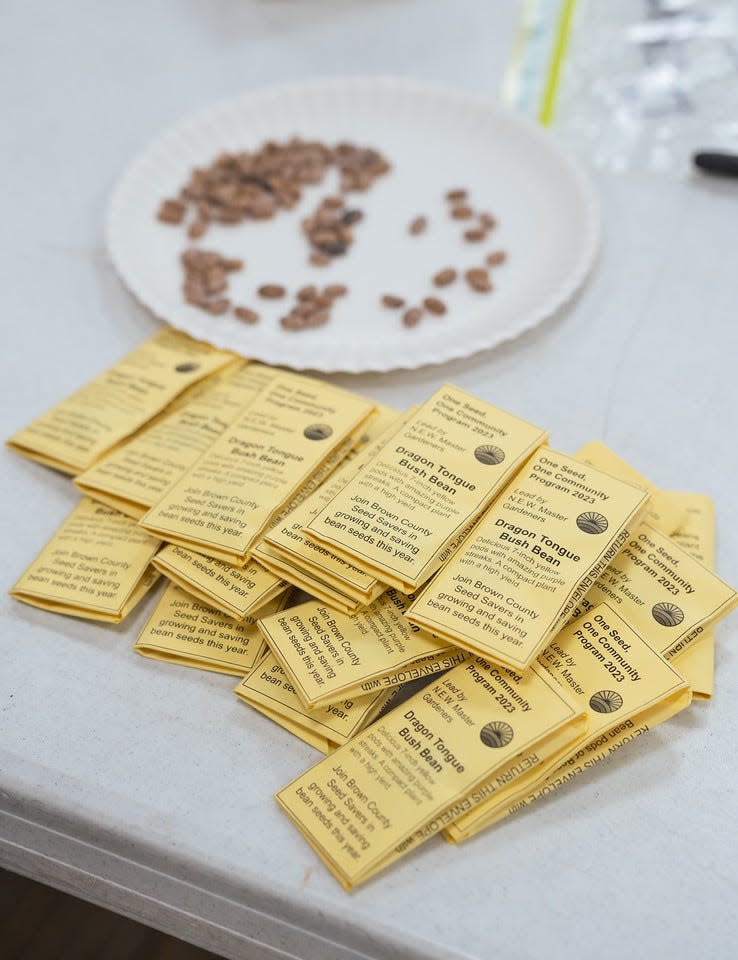Brown County's first seed library is set to launch. What is it and how can it help your garden grow?

GREEN BAY - Brown County will celebrate its first seed library in unusual but appropriate fashion — with a vine-cutting ceremony.
The new community resource meant to encourage people to get their hands in the dirt will open to the public on March 4 with a launch party at Brown County Central Library. Wanna grow? Here's what to know.
What is a seed library and how does it work?
The Brown County Seed Library is a collection of seeds, heavy on veggies, that are known to grow well in the climate and conditions of northeast Wisconsin. Seed packets are available free to gardeners of all levels and ages who are interested in growing their own vegetables, fruits and pollinator-friendly plants.
Organizers hope that through future training and initiatives, gardeners will learn basic seed-saving techniques and donate seeds back to the library in coming years to replenish the supply, but there is no obligation to do so.
For its inaugural year, the majority of the seeds were purchased in bulk or donated by businesses and then repackaged in smaller packets by volunteers at seed-sorting events.
“Our initial intent is to get those seeds out to people who can plant and grow their own fresh and nutritious food, but then we will also be offering some educational programs about seed saving,” said Sandy Kallunki, Brown County Central Library manager.
Wait, did you say free?
Yes. Seeds are free. The library operates on the honor system. People are asked only to take as many seeds as they will grow in their own garden. Seeds are available while quantities last. No library card is needed.
Where will the Brown County Seed Library be located?
You'll find it on the second floor of Brown County Central Library, 515 Pine St., in a vintage wooden card catalog cabinet donated by the University of Wisconsin-Green Bay. Packets are arranged alphabetically by common name and then by variety name. It will be accessible during regular library hours.
Having it at the library makes sense because of its public presence, central location, broad hours and availability of related gardening resources, both books and digital. It also ties in with the Cellcom Children’s Edible Garden, which is in its 11th year in front of the library.

What kinds of seeds will be available?
It’s primarily edible plants, including beans, peppers, tomatoes, beets, carrots, lettuce, peas, cabbage, okra, cauliflower, collards, mustard greens, radishes, tomatillos, spinach, onions, broccoli, chard, turnips, kohlrabi, okra, cucumbers and ground cherry. There will be some herbs, too.
A Three Sisters packet will include "Tuscarora" white corn, "Wild Pigeon" pole bean and "Cornfield" pumpkin squash. Three Sisters refers to a Native American method of growing corn, beans and squash as companion plants because they thrive together.
Seeds from native flowers that attract pollinators will also be available.
Who's behind the project?
It’s the collaborative effort of Brown County Library, Brown County Community Gardens Program, Green Bay Botanical Garden, New Leaf Foods Inc., Northeastern Wisconsin Master Gardeners, UW-Green Bay and UW Extension Brown County.
Organizers visited the Door County Seed Library that launched in 2018 at the Sturgeon Bay Library and met with the founder of the Appleton Seed Library that opened in 2016 to get firsthand information. It required writing grant proposals and securing donations to purchase basic start-up supplies, including bulk seeds. Having multiple groups involved will ensure there’s enough people behind it to keep it sustainable for years to come.
“It’s a very big project, but everybody was committed to doing their piece to make it possible. We’re confident this is going to be something that will run well and really serve the community well and meet a need," Kallunki said. "There’s just a lot of passion and enthusiasm for gardening in this area, and this project is really tapping into that and sharing it with a broader audience.”
Why is it a cool thing?
You mean besides the free seeds part? It also will introduce gardeners to varieties of plants that are known to grow well in this area. That helps ensure better rates of success for first-time gardeners and also introduces more seasoned gardeners to a Black Brandywine tomato or a "Golden Globe" turnip they may never thought to try before.
"Hopefully more people will get to grow some of the varieties that we have and maybe even just spark somebody's interest in a garden and that they can do it," said Eileen Rueden, past president of Northeastern Wisconsin Master Gardeners. "With the food prices out there, every little bit helps."
What's happening at the launch party?
The drop-in event from 1 to 3:30 p.m. March 4 will have activities for adults and children. Plant seeds to take home, create seed art, harvest seeds from dried heads, make paper helicopter seeds to launch from the balcony and meet Mother Nature. Local gardeners will be on hand to talk about seed starting, seed saving and recommended vegetable varieties to grow.
The vine-cutting ceremony, with a giant handcrafted fabric bean vine the library uses with its "Jack and the Beanstalk" programs, is scheduled for 1:10 p.m.
The launch party is the first chance to get seeds from the library.

Did someone say 'Dragon Tongue' beans?
Talk about your cool beans. "Dragon Tongue" is an easy-to-grow heirloom bush bean with purple streaks on its pods that disappear when you cook them. All that and they taste good, too.
As part of the launch party (and thereafter at the seed library), packets of the bean seeds will be available free to anyone who would like to be part of a project called One Seed, One Community, in which many growers harvest the same seed variety in their local climate.
Here's how it works: Participants grow the seeds (instructions included) and then harvest and return the first three bean pods from their plants. The goal is to build diversity in the genetics of the seed for Brown County growing conditions and gain an early harvest seed. It's both a fun way to get people interested in seed saving and an interesting citizen science project.
Where can I learn more about the seed library?
You’ll find a page dedicated to it at browncountylibrary.org/seed-library. It’s also the place to sign up for email updates on the library and future educational opportunities. The mailing list will help organizers track participation in the project. Links to growing and saving seeds will be added as they become available. Monetary donations to support the library can also be made through the website.
Kendra Meinert is an entertainment and feature writer at the Green Bay Press-Gazette. Contact her at 920-431-8347 or kmeinert@greenbay.gannett.com. Follow her on Twitter @KendraMeinert.

SUPPORT LOCAL JOURNALISM: Our subscribers make this coverage possible. Click to see the Green Bay Press Gazette's special offers at greenbaypressgazette.com/subscribe and download our app on the App Store or Google Play.
This article originally appeared on Green Bay Press-Gazette: Brown County Seed Library opening March 4 with mission of growing food

